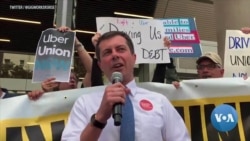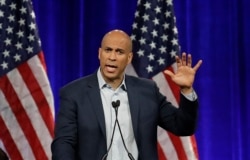U.S. presidential candidates have long come to Silicon Valley to raise money and, with a tech company campus as a backdrop, talk about innovation and the future.
But this year, things are different.
The 2020 presidential candidates are contending with the so-called “tech-lash,” the populist backlash against “Big Tech” over a host of issues, including data leaks, wealth accumulation, alleged erosion of worker rights, claims of censorship of conservative voices and concerns about the proliferation of extreme speech online.
Some political hopefuls are part of the tech-lash.
Recently, Pete Buttigieg, mayor of South Bend, Indiana, joined protesters outside Uber’s headquarters arguing for a new California bill that would make contract workers, like Uber drivers, employees. Other candidates, such as Senators Elizabeth Warren, Bernie Sanders and Kamala Harris, have also come out for the legislative measure.
Sanders has attacked technological innovations for upending local journalism and for what he calls biased policing, such as facial recognition technology. Warren says she would like to break up some of the tech giants.
“The area around these giants is referred to by venture capitalists investors as the ‘dead zone,’” Warren said during a CNN event. “You try to start up a business, you run the risk that Amazon steps in front of you or Google steps in front of you or buys you out before you get started.”
California senator
As California’s attorney general, Harris raised the issue of the lack of privacy policies on apps. So far, she has not made the tech industry a big issue in her national campaign.
But that may change.
When asked about the growth of companies such as Facebook, Harris told CNN, “There is no question in my mind that there needs to be serious regulation. ... There needs to be more oversight; that has not been happening.”
Trump and Silicon Valley
President Donald Trump has led the way in puncturing tech’s one-time white hat image, hitting the industry hard on a range of issues, including allegedly censoring conservative voices online. He recently falsely claimed that Google manipulated votes.
But some candidates don’t want to mimic Trump’s style of conflict when it comes to tech.
When asked about the idea of breaking up Facebook, New Jersey Senator Cory Booker said, “That sounds more like a Donald Trump kind of thing.”
He added, “We do not need a president that is going to use their own personal beliefs and tell you which companies we should break up. ... We need a president that’s going to enforce antitrust laws in this country, and I will be that person.”
Big tech — good or bad for America?
All this negative attention puts the tech industry in a bind, unsure which potential presidential hopeful might be an ally, said Lanhee Chen, who was head of policy for Republican Mitt Romney’s presidential campaign in 2012.
“Certainly there are still people who believe in the value of technology companies, who understand tech as an important industry, an important contributor to the economy,” Chen said. “But increasingly I think people’s views have become more nuanced. And unfortunately, for the technology companies, in many cases, more negative.”
There’s a danger, however, in attacking tech, said Donnie Fowler, a longtime Democratic consultant and now an adjunct professor at the University of San Francisco.
“The Democratic presidential candidates can’t come to Silicon Valley and attack technology and innovation broadly,” Fowler said. “You can’t come here and say that everything Silicon Valley is doing is bad for the country, bad for the economy, bad for Americans. Americans don’t even believe that.”
Tech CEO, employee divide
Campaign contributions offer a snapshot of the candidates and their relationship to the tech industry.
According to the Center for Responsive Politics, contributions from workers at Alphabet, the parent company of Google, or the organizations’ political action committee, were the highest contributors to Buttigieg and Warren.
In contrast, tech executives have given to Democrat moderates such as Booker and former Vice President and Democratic front-runner Joe Biden, both of whom have not made tech much of an issue, according to CNBC.
YouTube recommendation algorithm
Max Kaehn, a Google software engineer, who has donated to Warren and other candidates, said he welcomes politicians who criticize his employer and other tech giants.
“With great power comes great responsibility and the tech companies have great power. We should get some scrutiny over it,” he said.
Some areas to look at, Kaehn said, is Amazon’s treatment of its warehouse workers, Facebook’s use of data and YouTube, which is owned by his employer, Alphabet.
“I think we should be talking about the YouTube recommendation algorithm,” he said.
While YouTube’s algorithm hasn’t come up in the Democratic presidential debates, observers say issues like these, once seen as esoteric or niche, may become front and center, reflecting the country’s ambivalence about the growing role of technology in their lives.








